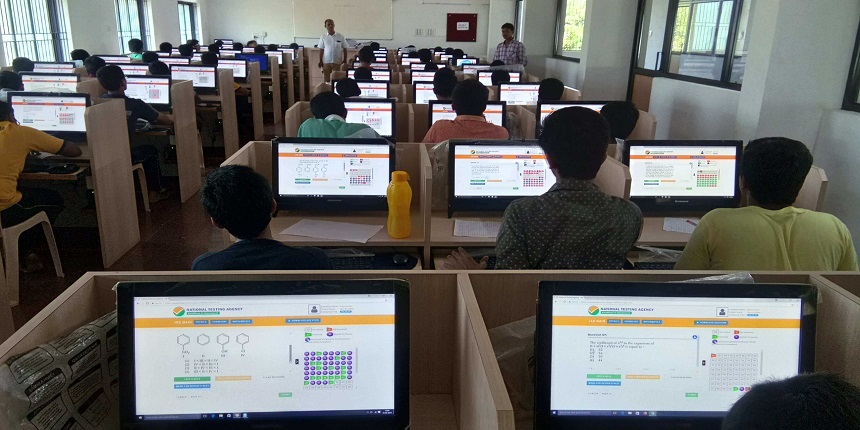Will JEE Main 2024 syllabus be reduced? Students ask after NMC revised NEET UG syllabus
Anu Parthiban | October 12, 2023 | 12:54 PM IST | 3 mins read
JEE Main 2024 will be held in 2 sessions - session 1 from January 24 to February 1 and session 2 from April 1 to 15. Know topics asked, weightage here.
JEE Main 2026 College Predictor
Discover your college admission chances with the JEE Main 2026 College Predictor. Explore NITs, IIITs, CFTIs and other institutes based on your percentile, rank, and details.
Try Now
NEW DELHI: After the National Medical Commission (NMC) revised the syllabus for National Eligibility-cum-Entrance Test -undergraduate (NEET UG 2024), engineering aspirants have started demanding clarity on the Joint Entrance Examination-Main (JEE Main 2024) syllabus. With just three months left for the JEE Main January session, registration is also expected to begin soon on the official website, jeemain.nta.nic.in 2024.
JEE Main 2026: Result OUT; Check Now | Final Answer Key Link
JEE Main 2026 Tools: College Predictor
JEE Main 2026: Session 2 Registration Link | Foreign Universities in India
MBBS and BTech are the most sought after courses after Class 12. More than 20 lakh students registered for NEET UG and over 11 lakh appeared in the JEE Main entrance exam last year.
On October 7, the NMC after the approval from the Undergraduate Medical Education Board (UGMEB) issued the updated NEET syllabus 2024. The exam is scheduled to be held on May 5, months after the commencement of JEE 2024.
The National Testing Agency (NTA), which published the exam calendar for the upcoming academic year, announced that the JEE Main exam 2024 will be held in two sessions - January and April.
As per the schedule announced, JEE Main 2024 session 1 will be held from January 24 to February 1 and session 2 from April 1 to 15, 2024.
Broadly, the JEE Main syllabus includes topics from NCERT Class 11 and 12 subjects. The total number of questions to be attempted is expected to remain the same - physics – 25; chemistry – 25; and mathematics – 25.
Also read | NEET UG 2024 syllabus revised; know physics, chemistry, biology updated topics
JEE Main 2024: Physics syllabus
Aspirants can find the topics included in physics syllabus and the weightage, as per previous year question paper.
Physics topics and weightage | |
Physics and Measurement - 3% | Electrostatics - 8% |
Kinematics - 3% | Current Electricity - 8% |
Laws of motion - 3% | Magnetic Effects of Current and Magnetism - 8% |
Work Energy and Power - 3% | Electromagnetic Induction and Alternating currents - 6% |
Rotational Motion - 6% | Electromagnetic Waves - 3% |
Gravitation - 3% | Optics - 8% |
Properties of Solids and Liquids - 5% | Dual Nature of Matter and Radiation - 3% |
Kinetic theory of Gases - 3% | Atoms And Nuclei - 3% |
Thermodynamics - 8% | Electronic devices- 5% |
Oscillations and Waves - 5% | Communication Systems - 3% |
Experimental skills - 3% |
JEE Main 2024: Chemistry syllabus
Chemistry chapters and weightage | |
Some basic concepts in chemistry -5% | p- Block Elements - 4% |
Atomic Structure - 3% | d - and f - Block Elements - 3% |
Classification of Elements and Periodic table - 4% | Coordination Compounds - 8% |
Chemical Bonding and Molecular Structure - 3% | Some Basic Principles of Organic Chemistry - 4% |
States of matter - 2% | Hydrocarbons - 4% |
Chemical Thermodynamics - 4% | Organic Compounds containing Halogens - 3% |
Equilibrium- 3% | Organic Compounds containing Oxygen - 7% |
Redox Reaction and Electrochemistry - 4% | Organic Compounds Containing Nitrogen - 4% |
Solutions - 6% | Biomolecules - 2% |
Chemical kinetics- 5% | Polymers - 2% |
Surface Chemistry - 3% | Environmental Chemistry - 4% |
General Principle and process of Isolation of metals - 4% | Chemistry in Everyday Life - 1% |
Hydrogen - 3% | Purification and Characterisation of Organic Compounds - 1% |
S - Block Elements (Alkali and Alkaline Earth Metals) - 3% | Principles Related to Practical Chemistry - 1% |
JEE Main 2024: Mathematics syllabus
Mathematics chapters and weightage | |
Sets, Relations and Functions - 4% | Differential equations - 4% |
Complex numbers and quadratic equations - 8% | Vector Algebra - 4% |
Matrices and Determinants - 5% | Three Dimensional Geometry - 8% |
Sequence and series - 6% | Permutations and combinations - 3% |
Trigonometry - 6% | Binomial theorem and its simple applications - 4% |
Coordinate geometry - 14% | Statistics and Probability - 8% |
Limit , continuity and differentiability -12% | Mathematical Induction - 1% |
Integral Calculus - 9% | Mathematical reasoning - 4% |
Follow us for the latest education news on colleges and universities, admission, courses, exams, research, education policies, study abroad and more..
To get in touch, write to us at news@careers360.com.